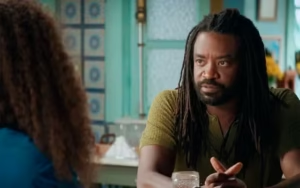Francisco San Martin, the Spanish-born actor best known for his role as Dario Hernandez on Days of Our Lives, passed away at the age of 39 in his Los Angeles home on January 16, 2025. According to the Los Angeles County Medical Examiner’s Office, his death was ruled a suicide by hanging. The news sent waves of shock and grief through fans and colleagues, shedding light on the struggles faced by artists in today’s world and raising critical awareness about mental health.
Born in Mallorca, Spain, San Martin began his artistic journey in children’s theater productions in the U.S. state of Montana, where he spent part of his childhood. Returning to Spain in his teenage years, he immersed himself in acting classes and later built a solid career that eventually brought him back to the United States. His rise to fame was a testament to his natural talent and relentless dedication to his craft, securing memorable roles that left a lasting impact on audiences.
San Martin gained widespread recognition for his performance on Days of Our Lives from 2010 to 2011, where he played Dario Hernandez. Initially introduced as a thief, his character later revealed himself as an investigator on a cold case. San Martin’s captivating performance secured his place in the collective memory of soap opera fans, even as he explored other significant opportunities in his career.
A career defined by versatility and passion
Francisco San Martin stood out for his versatility as an actor, transitioning seamlessly between different formats and genres. After earning recognition on Days of Our Lives, he joined The Bold and the Beautiful in 2017, portraying Mateo, a property manager entangled in intriguing storylines. His on-screen versatility was further evident in productions such as Behind the Candelabra, alongside Michael Douglas and Matt Damon, and Jane the Virgin, where he worked with Gina Rodriguez.
Beyond television, San Martin showcased his skills in theater productions in Spain, building a strong foundation as an artist. His roles in film and television projects demonstrated his ability to bring depth and authenticity to a variety of characters. His work was consistently praised, not only for its technical brilliance but also for the emotional depth he infused into his performances.
Tributes from colleagues and a profound loss in the artistic community
The news of Francisco’s passing prompted an outpouring of tributes from friends, colleagues, and fans. Camila Banus, who played his sister Gabi on Days of Our Lives, shared a heartfelt message on her social media, expressing love and admiration for her co-star. Others highlighted the profound impact of his presence on and off set, remembering him as a kind, dedicated, and inspiring individual.
Michael Fairman, a journalist specializing in soap operas, also expressed his sadness, recalling frequent encounters with Francisco at a local gym, where the actor maintained a disciplined routine. These personal anecdotes emphasize the human side of Francisco, beyond his professional achievements. He was not just a talented actor but also a cherished friend and a source of inspiration to many.
Mental health challenges in the entertainment industry
Francisco San Martin’s tragic death underscores the mental health challenges faced by performers in the highly competitive and demanding entertainment industry. Suicide remains a significant global public health issue, claiming the lives of over 700,000 individuals annually, according to the World Health Organization (WHO). It is the fourth leading cause of death among young people aged 15 to 29.
The entertainment industry, in particular, is known for its intense pressures, which can exacerbate mental health struggles. Studies indicate that performers are at a significantly higher risk of experiencing anxiety, depression, and other psychological challenges due to public scrutiny and the unpredictable nature of their careers.
Statistics on mental health and prevention efforts
Efforts to combat the impact of suicide include initiatives like the 988 Suicide and Crisis Lifeline in the United States, which provides immediate support for individuals in crisis. Services like these play a vital role in connecting people to mental health resources and saving lives. However, experts stress that addressing suicide requires more than emergency support. Cultivating a culture of empathy, where individuals feel comfortable seeking help without fear of judgment, is equally essential.
In the entertainment world, tailored mental health programs for artists could help reduce stigma and provide practical tools to navigate the unique challenges of the industry. Raising awareness and offering proactive support could prevent future tragedies.
Francisco San Martin’s cultural and artistic legacy
Despite his untimely death, Francisco leaves behind a significant legacy in the entertainment world. His work on Days of Our Lives stands as a milestone in his career, showcasing his ability to bring complex characters to life and captivate audiences. His story is a poignant reminder of the profound impact that artists can have, even within a relatively short span of time.
Francisco’s journey highlights the importance of nurturing and supporting artistic talent. His dedication to his craft and his courage in facing personal challenges serve as an inspiration. His work continues to resonate, not just in reruns and memories but also in the lives he touched through his artistry.
The need for preventive action
Francisco San Martin’s loss reinforces the urgent need for robust measures to prevent similar tragedies. Beyond access to mental health resources, fostering open conversations about mental health is crucial, both in personal and professional spaces. Artistic organizations and the industry as a whole must take responsibility for creating environments where performers can thrive without compromising their well-being.
Francisco’s story serves as a reminder of the value of each talent and the devastating impact of inadequate support. Promoting a compassionate and inclusive approach to mental health is not just a necessity; it is a moral imperative.

Francisco San Martin, the Spanish-born actor best known for his role as Dario Hernandez on Days of Our Lives, passed away at the age of 39 in his Los Angeles home on January 16, 2025. According to the Los Angeles County Medical Examiner’s Office, his death was ruled a suicide by hanging. The news sent waves of shock and grief through fans and colleagues, shedding light on the struggles faced by artists in today’s world and raising critical awareness about mental health.
Born in Mallorca, Spain, San Martin began his artistic journey in children’s theater productions in the U.S. state of Montana, where he spent part of his childhood. Returning to Spain in his teenage years, he immersed himself in acting classes and later built a solid career that eventually brought him back to the United States. His rise to fame was a testament to his natural talent and relentless dedication to his craft, securing memorable roles that left a lasting impact on audiences.
San Martin gained widespread recognition for his performance on Days of Our Lives from 2010 to 2011, where he played Dario Hernandez. Initially introduced as a thief, his character later revealed himself as an investigator on a cold case. San Martin’s captivating performance secured his place in the collective memory of soap opera fans, even as he explored other significant opportunities in his career.
A career defined by versatility and passion
Francisco San Martin stood out for his versatility as an actor, transitioning seamlessly between different formats and genres. After earning recognition on Days of Our Lives, he joined The Bold and the Beautiful in 2017, portraying Mateo, a property manager entangled in intriguing storylines. His on-screen versatility was further evident in productions such as Behind the Candelabra, alongside Michael Douglas and Matt Damon, and Jane the Virgin, where he worked with Gina Rodriguez.
Beyond television, San Martin showcased his skills in theater productions in Spain, building a strong foundation as an artist. His roles in film and television projects demonstrated his ability to bring depth and authenticity to a variety of characters. His work was consistently praised, not only for its technical brilliance but also for the emotional depth he infused into his performances.
Tributes from colleagues and a profound loss in the artistic community
The news of Francisco’s passing prompted an outpouring of tributes from friends, colleagues, and fans. Camila Banus, who played his sister Gabi on Days of Our Lives, shared a heartfelt message on her social media, expressing love and admiration for her co-star. Others highlighted the profound impact of his presence on and off set, remembering him as a kind, dedicated, and inspiring individual.
Michael Fairman, a journalist specializing in soap operas, also expressed his sadness, recalling frequent encounters with Francisco at a local gym, where the actor maintained a disciplined routine. These personal anecdotes emphasize the human side of Francisco, beyond his professional achievements. He was not just a talented actor but also a cherished friend and a source of inspiration to many.
Mental health challenges in the entertainment industry
Francisco San Martin’s tragic death underscores the mental health challenges faced by performers in the highly competitive and demanding entertainment industry. Suicide remains a significant global public health issue, claiming the lives of over 700,000 individuals annually, according to the World Health Organization (WHO). It is the fourth leading cause of death among young people aged 15 to 29.
The entertainment industry, in particular, is known for its intense pressures, which can exacerbate mental health struggles. Studies indicate that performers are at a significantly higher risk of experiencing anxiety, depression, and other psychological challenges due to public scrutiny and the unpredictable nature of their careers.
Statistics on mental health and prevention efforts
Efforts to combat the impact of suicide include initiatives like the 988 Suicide and Crisis Lifeline in the United States, which provides immediate support for individuals in crisis. Services like these play a vital role in connecting people to mental health resources and saving lives. However, experts stress that addressing suicide requires more than emergency support. Cultivating a culture of empathy, where individuals feel comfortable seeking help without fear of judgment, is equally essential.
In the entertainment world, tailored mental health programs for artists could help reduce stigma and provide practical tools to navigate the unique challenges of the industry. Raising awareness and offering proactive support could prevent future tragedies.
Francisco San Martin’s cultural and artistic legacy
Despite his untimely death, Francisco leaves behind a significant legacy in the entertainment world. His work on Days of Our Lives stands as a milestone in his career, showcasing his ability to bring complex characters to life and captivate audiences. His story is a poignant reminder of the profound impact that artists can have, even within a relatively short span of time.
Francisco’s journey highlights the importance of nurturing and supporting artistic talent. His dedication to his craft and his courage in facing personal challenges serve as an inspiration. His work continues to resonate, not just in reruns and memories but also in the lives he touched through his artistry.
The need for preventive action
Francisco San Martin’s loss reinforces the urgent need for robust measures to prevent similar tragedies. Beyond access to mental health resources, fostering open conversations about mental health is crucial, both in personal and professional spaces. Artistic organizations and the industry as a whole must take responsibility for creating environments where performers can thrive without compromising their well-being.
Francisco’s story serves as a reminder of the value of each talent and the devastating impact of inadequate support. Promoting a compassionate and inclusive approach to mental health is not just a necessity; it is a moral imperative.







